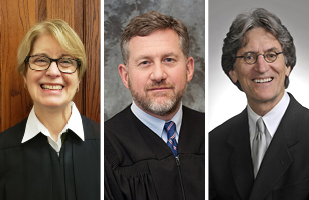Dozens of Judges Concluding Decades of Dedicated Service

Judges Charlotte Eufinger (left), Paul Herbert (center), and Edward O’Farrell (right) are among the more than 40 jurists stepping away from the bench in 2021.

Judges Charlotte Eufinger (left), Paul Herbert (center), and Edward O’Farrell (right) are among the more than 40 jurists stepping away from the bench in 2021.
Every December presents mixed emotions with the finality of another chapter of life and all of the unknowns that await in the upcoming year. Those sensations will be even more evident for the Ohio judges leaving the bench in 2021.
In total, more than 40 jurists will step down from the bench between Jan. 1 and April 18, 2021. Many are leaving due to a constitutional age limitation, which prevents judges in Ohio from taking office after they’ve turned 70. For others, they cited personal reasons – mainly family and health – for putting down their gavels and robes for good.
“It’s a strange feeling,” said Union County Probate and Juvenile Court Judge Charlotte Eufinger after serving the post for the past 18 years.
Tuscararwas County Common Pleas Judge Edward O’Farrell has spent more than half of his life upholding the law in his courtroom. Of his 45 years as a practicing attorney, 39 were as a member of the judiciary.
“When I was elected a judge, it changed my persona. It’s going to be hard to adjust,” Judge O’Farrell said.
While Judges Eufinger and O’Farrell couldn’t retain their seats due to the age limitation, Franklin County Municipal Court Judge Paul Herbert decided that after 35 years as public employee, including positions as the court’s clerk, a county prosecutor, and a bailiff, now was the right time to retire.
As the son and grandson of Ohio Supreme Court justices – Thomas M. Herbert and Paul Herbert, respectively – Judge Herbert created his own legacy at the trial court level. In developing the state’s first human trafficking specialized docket, Changing Actions that Change Habits (CATCH) Court, he helped alter the way the justice system views human trafficking victims from criminals to survivors of heinous crimes and years of exploitation in need of treatment.
“[CATCH Court] became a nonstop mission of mine for the last 11 years. I talked about it in as many venues as I could with how this population is mislabeled. It’s been remarkable to see multi-generational healing within families after a loved one gets the care needed to recover from physical abuse, substance use, and mental health issues,” Judge Herbert said.
Another pioneering figure on the bench, Judge Eufinger blazed a unique trail in her hometown of Marysville. As one of the first women to practice law in Union County, she followed in her father’s footsteps as an attorney, quickly becoming a magistrate early in her career.
“I wanted to be a lawyer from the fourth grade after watching my dad,” Judge Eufinger said.
Inevitably, the family-centric person with a fondness for her community was drawn to the judiciary by the opportunity to impact other households as a probate and juvenile court judge.
Since taking office in 2003, she’s expanded the court’s reach into the community. Her work with the Union County Volunteer Guardian Program has addressed a need for court-appointed legal guardians to look after incompetent adults without family or friends who can facilitate that role. But her biggest contribution, arguably, has been reshaping lives in her drug court and family dependency court for more than a decade.
“You never know whether things are going to stick [in a treatment court]. It’s a lengthy process, but the participants know the people involved care about them. That’s an important thing,” Judge Eufinger said.
In contrast to the seemingly destined paths for Judges Herbert and Eufinger, Judge O’Farrell’s faith in the legal profession was fostered during a yearslong pursuit of priesthood.
After changing his calling, he endured two failed Ohio Bar Examinations at a time when applicants were limited to only three attempts. Carried by his conviction as the father of two young girls while working as an assistant manager at a beauty school, he passed the bar on his final try.
“It was sheer terror. I’ve never experienced a more difficult time in my life where I had to struggle with the thought that I could never be a lawyer, never do what I know I could do well. I had to bring some closure to that,” Judge O’Farrell said.
When traveling to Tuscarawas County for a case, the small-town Wisconsin native felt at home in the rural community. The legal aid attorney felt it was the perfect setting to raise a family, and to instill his principles that strive for social justice.
“I’ve never portrayed myself as a legal scholar. My strength is that I know how to treat people and manage a case, and to bring appreciation and understanding in civil justice for all parties involved,” Judge O’Farrell said.
So, what’s next?
All three judges say they’ll use their added free time to travel. In a post-pandemic world, Judge O’Farrell and his wife plan to live part-time in Madrid to be near one of his daughters and her family.
Judge Herbert is opting for warm weather year-round when he moves to Florida in January.
Judge Eufinger will try to quench her thirst for knowledge by taking university courses, studying Spanish, and learning how to play the guitar.
All are fruitful rewards for decades of dedicated service. However, their connections to the judicial system will remain open through work with the Ohio Judicial Conference and as members of the Judicial Assignment Program, which allows retired judges to preside over cases assigned to them by Ohio Supreme Court Chief Justice Maureen O’Connor.
“I’m going to miss the fact that I have made a difference, but this will help me continue to make a difference,” Judge O’Farrell said.


